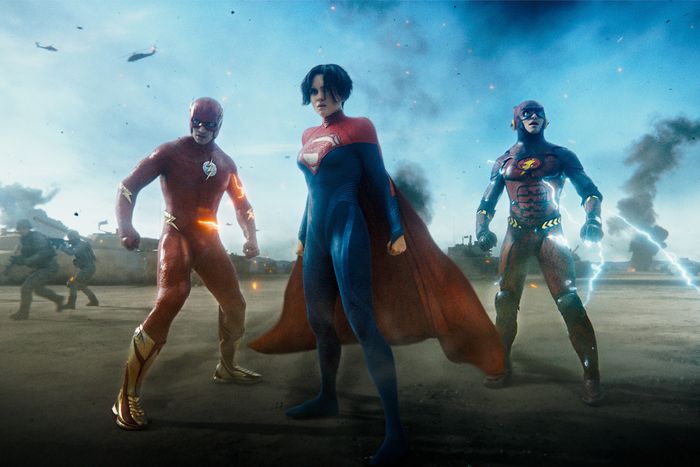
Heading into its world premiere at this year’s CinemaCon, the DC Extended Universe’s long-gestating, standalone superhero thriller The Flash faced a vexing set of expectations. On one hand, the $200 million tentpole (out June 16) has been performing incredibly well with test audiences since at least last summer, reportedly turning in “some of the highest scores at test screenings since Christopher Nolan’s Dark Knight movies.” Newly installed DC co–head honcho James Gunn called the film “probably one of the greatest superhero movies ever made,” adding that its plot line “resets everything” for the franchise. On the flip side, no multiplex offering has become more associated with embattled actor Ezra Miller than their marquee outing as the superhuman speed demon. Over the last five or so years, as the 30-year-old performer’s behavior grew increasingly bizarre — encompassing arrests, court appearances, erratic red-carpet etiquette, and social-media rants as well as allegations of physical violence, harassment, grooming, and abuse — The Flash came to embody Miller’s perceived career suicide: precisely the type of mega-budget star vehicle they would now and forever be squandering thanks to the consequences of all that unruly acting out. In turn, such bad buzz became a PR nightmare for the movie.
While better known for launching teasers, trailers, and first-look sizzle reels (sometimes days or even just minutes before they hit the internet), CinemaCon — Las Vegas’s annual extravaganza at which movie-theater-chain executives and owners come to be astonished by sneak peeks at Hollywood’s impending blockbusters — has hosted a number of premieres for what later turn out to be gigantic movies. Last year, the convention Colosseum showcased the first-ever screening of Top Gun: Maverick, which triggered unexpected paroxysms of joy (and even tears) among conventioneers and went on to become 2022’s most lucrative movie.
This year, The Flash occupied that Tuesday-evening spot. Earlier in the day, during the panel presentation by the film’s studio distributor, Warner Bros., director Andy Muschietti didn’t exactly adjust expectations downward. He effused over Miller, calling them an “incredible actor” — “One of the best actors I’ve ever worked with. He has everything. He has every tool in the tool kit. He has emotion. He’s an incredible comedian,” the director said from the stage, initially using the wrong pronouns for Miller before catching himself. “And the action — they wanted to do all the stunts, and I let them.”
As the lights came up at Caesars, movie first responders basically agreed The Flash lived up to the hype and attempted to one-up each other in a metaphorically appropriate rush to hyperventilate over The Flash’s artistic merits on Twitter.
Immediately following the screening, an executive from a competing studio gave The Flash backhanded compliments as a corrective to the commercial underperformance of the DCEU’s most recent entries: October’s Black Adam and the franchise-killing Shazam! Fury of the Gods. “Audiences want nostalgia, and they want feel-good. Execution is less important,” this exec said. “The Flash is like Spider-Man: No Way Home in that it has the right amount of nostalgia, which the fans love, and the right amount of feel-good. This is DC righting the ship.”
It wasn’t so long ago, after all, that Warner Bros. was still entertaining the option of “killing the movie outright” as remedy to Miller’s echo chamber of bad buzz, and taking a hefty tax write-down as the studio did last summer with Batgirl. On Tuesday Jeff Goldstein, Warner Bros.’ executive vice-president of domestic theatrical distribution, admitted to me his “stomach had been in knots for hours” in anticipation of first reactions and felt a measure of relief at the ecstatic public reception.
Less than an hour after the screening, at a party at the Las Vegas outpost of the Hollywood industry hangout the Palm, I pointed out to Mike DeLuca, co-chairperson and CEO of the Warner Bros. film group, that Miller would inevitably face tough questioning on the film’s promo circuit. I asked if the studio had a plan in place for how they were going to speak to the press. “In a weird way, it’s not a PR-driven film,” DeLuca said. “So we don’t necessarily have to put Ezra out in front of its push. They’re doing really well these days. We’ll see how they’re doing closer to release.”
More From CinemaCon
- We’re Probably Getting Rihanna’s Smurf Songs Before R9
- Nolan Says Oppenheimer Is About ‘the Most Important Person Who Ever Lived’
- The New Indiana Jones 5 Footage Would Make Marion Ravenwood Proud


